As business owners ourselves, we’re very familiar with CRM software and why it’s important for managing customer relationships, increasing sales, handling leads, and growing your business.
We’ve been long-time fans of HubSpot and FunnelKit, finding them incredibly helpful for customer relationships. But we also know that not every business has the same needs or resources.
That’s why we decided to put these tools to the test, along with several other popular options, to see if they truly are the best choices out there.
In this article, we’ll share our findings to help you, our readers, make an informed decision. We’ll compare the top CRM software in terms of features, pricing, and usability, weighing the pros and cons of each.
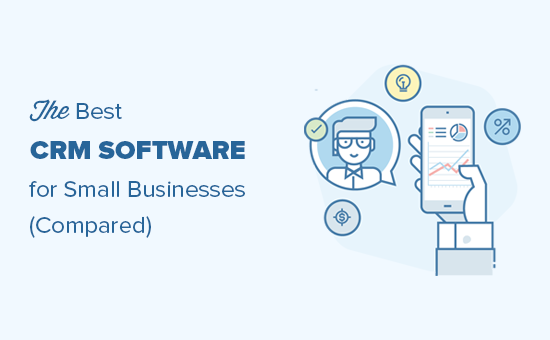
Our Top Picks for the Best CRM Software
| # | Software | Pricing | Key Features |
|---|---|---|---|
| 🥇 | HubSpot | $15/mo/user | Free plan, comprehensive tools, 300+ integrations |
| 🥈 | FunnelKit Automations | $99.50/year | 360-degree contact view, automated workflows, WooCommerce optimization |
| 🥉 | Constant Contact | $12/mo | Easy-to-use interface, email marketing, eCommerce tools |
| 4 | Salesflare | $29/mo/user | Automated data capture, visual pipeline, smart follow-ups |
| 5 | Pipedrive | $14/mo/user | Sales forecasting, customizable pipelines, mobile apps |
| 6 | Freshsales | $9/mo/user | AI-powered lead scoring, visual pipelines, custom workflows |
| 7 | Drip | $39/mo | eCommerce tracking, marketing automation, multi-channel campaigns |
| 8 | Streak CRM | $49/mo | Gmail integration, automated lead capture, custom pipelines |
How We Reviewed the Best CRM Software
To help you find the best CRM software for your small business, we’ve carefully evaluated each option based on key factors that matter most to growing companies. Here’s what we considered in our review process:
- Ease of Use – We put a strong emphasis on user-friendliness. After all, 67% of businesses say it’s the most important feature. If a CRM is hard to use, it won’t help your business grow and improve your customer service.
- Cloud and Mobile Capabilities – We favored cloud-based CRMs, which make up 87% of the market today. They’re more secure, faster, and play well with other apps. We also looked for mobile-friendly options, as 65% of companies using mobile CRMs exceed their sales targets.
- Essential Features – We created a checklist of must-have features for small businesses. While every company’s needs are unique, we focused on CRMs that go beyond being just a fancy address book. The best options integrate with your marketing, sales, and lead generation processes.
- Integration Options – We checked how well each CRM works with other tools you likely use, like your WordPress website, email marketing service, and social media platforms. The more integrations available, the more versatile the CRM.
- Value for Money – While we didn’t solely focus on price, we considered the value each CRM offers. We looked at free plans, paid options, and what you get at different price points.
Why Trust WPBeginner?
Our team of WordPress experts, with over a decade of industry knowledge, thoroughly tests every product we recommend. We aim to provide honest, practical advice based on real experience, whether from user reviews or our own expertise in WordPress, eCommerce, and digital marketing.
You can learn more in our editorial guidelines.
That being said, let’s take a look at the top CRM software on the market and how they stack up on these criteria.
1. HubSpot
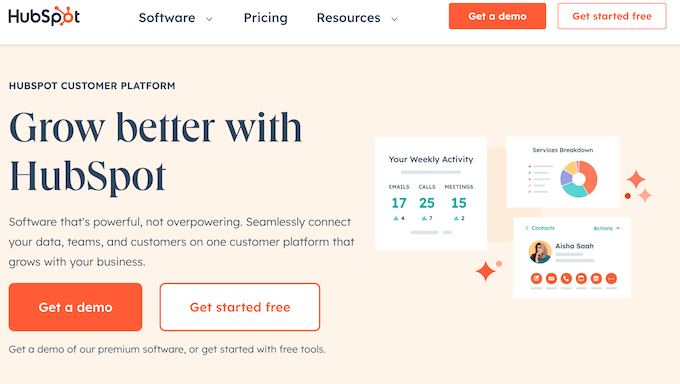
HubSpot is one of the best CRM software for small businesses we’ve tried, and it’s great for those looking for a cost-effective solution to get started. It offers free plans for its CRM, Marketing, Sales, and Service hubs.
The free HubSpot CRM comes with unlimited users and unlimited contacts. It is also free forever. If you want more information, we’ve covered the tool extensively in our HubSpot review.
HubSpot is quite easy to use, and you can connect marketing, sales, and service hubs to your CRM software. This provides you with a wide range of tools to efficiently manage the customer journey.
With an easy user interface, you get a bird’s eye view of your entire sales pipeline on your dashboard. You can view detailed reports, all contact activities, sales activities, and user/team performance.
HubSpot offers a comprehensive set of features, including mobile apps for iPhone and Android, a contact manager, email templates, real-time notifications, phone calls, email tracking, scheduling, and more.
Integrations are crucial for CRM software. HubSpot integrates with more than 300 apps and services, including WordPress, top email marketing services, lead generation software like OptinMonster, and many more.
One thing we don’t really like is many of the features are limited or unavailable in the free plan. To access the powerful features, you will need to upgrade to one of their paid plans under the Growth Suite.
Pricing: HubSpot offers the core CRM platform for free. For more features, you can upgrade to their paid plans for Marketing, Sales, and Service hubs, which start from $15 per month per user.
2. FunnelKit Automations
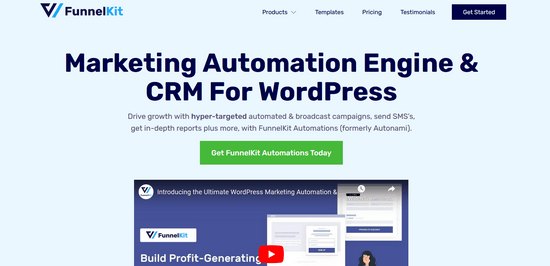
If you’re looking for CRM specifically optimized for WordPress and WooCommerce, then we recommend FunnelKit Automations.
It’s a powerful CRM and marketing automation engine for WooCommerce. It’s packed with features that will help your online store get higher order values and repeat sales. We’ve talked more about this tool before in our FunnelKit review.
What we love about FunnelKit Automations is you can see every detail about your customers with a 360-degree contact view. This includes name, email, gender, geographical location, tags, lists, and custom field data.
You can also see their entire purchase history, including orders placed, items bought, coupons that were used, and more.
Aside from the CRM, FunnelKit Automations allows you to easily create automated email and SMS sequences to nurture your relationships and boost sales.
Using the drag-and-drop builder and pre-built workflows, you can quickly set up personalized campaigns for abandoned cart recovery, next order coupons, shipment tracking notifications, subscription renewal reminders, and more.
In addition, FunnelKit Automations comes with features like detailed analytics, revenue tracking, audience segmentation, contact journey, A/B testing, and seamless integrations with popular apps and plugins.
Pricing: FunnelKit Automations starts at $99.50 per year or $249.50 per year with the FunnelKit plugin, which is one of the best sales funnel builders on the market.
3. Constant Contact
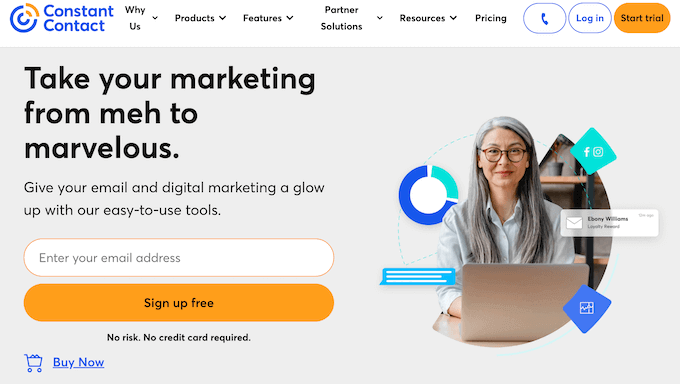
Constant Contact is a popular email marketing and CRM software. It allows you to easily store contacts, manage customer information, send emails, and track customer activity from your dashboard.
What we love about Constant Contact is it is extremely easy to use with simple reports, detailed activity logs for each contact, and powerful drag-and-drop tools to send out emails. You can schedule emails, create sales funnels, and have easy marketing automation for beginners.
Constant Contact also has a huge marketplace of integrations available for third-party apps. Many of the popular services and tools that you are already using, like WPForms, can be instantly connected to Constant Contact.
For eCommerce stores, Constant Contact offers integrations with all top eCommerce platforms. It includes eCommerce tools that help you capture, engage, and convert leads into paying customers.
Pricing: Their pricing is based on the number of contacts and starts from $12 per month. However, if you want to add team members, then you will need their Standard plan, which starts at $35 per month.
WPBeginner users get a free 60-day trial, and you can also get 20% off the first 3 months if you use our Constant Contact coupon code.
Click here to get started with Constant Contact.
4. Salesflare
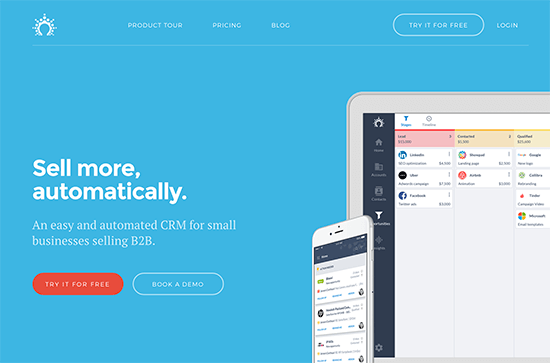
Salesflare is a powerful and easy-to-use CRM software for small businesses. The platform is built around four cornerstone features: organize, integrate, communicate, and automate.
We like that Salesflare CRM puts us in control by showing us everything in one place in a visual pipeline format. Here, ou can collaborate with team members, add tasks, set up custom fields, see live notifications, and get insights.
One of the standout features we found on the platform is the fully automated contact and company information autofill. Instead of you searching LinkedIn profiles and other channels, Salesflare automatically fills the address book.
They integrate with over 1000+ popular platforms, including email marketing services and other business tools.
Salesflare smart follow-up tools make it so you are always on top and never miss a follow-up opportunity. They have smart automation that lets you follow up based on customer interaction and triggers.
Pricing: Salesflare offers a free trial. Their plan starts at $29 per month per user.
5. Pipedrive
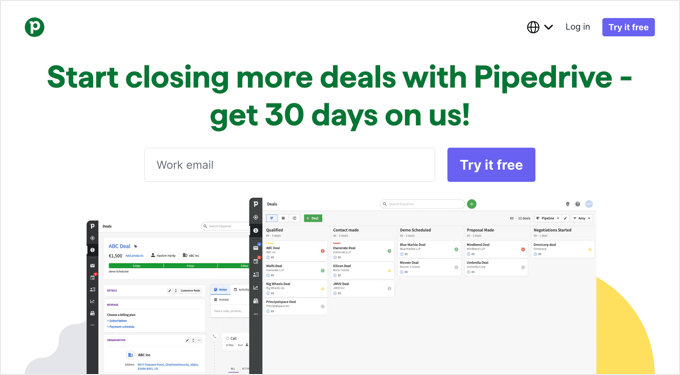
Pipedrive is a sales-driven CRM software for businesses. It offers complete sales pipeline management with an intuitive user interface that gives you quick access to all the information you need.
After reviewing the tool, we think that this platform is best for sales teams. That’s because it includes features like sales reporting, sales forecasting, detailed activity logs, advanced contact details, email integrations, and customizable pipelines.
It has a growing selection of integration apps, allowing you to connect your CRM system to other services you already use. It also has mobile apps for iOS and Android, allowing you to stay connected and get things done.
Pricing: Their plans start from $14 per user per month, billed annually.
6. Freshsales
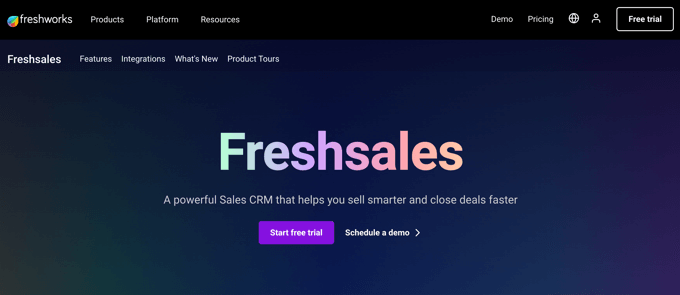
Freshsales is another popular CRM software suitable for businesses of all sizes. It features a sales-oriented approach with tools to maximize your conversions.
When we first set up Freshsales, we were impressed by its one-stop dashboard that gives us instant access to reports, activities, phone calls, emails, users, and contact management. It has an intuitive web-based interface and powerful mobile apps to help your teams make sales on the go.
Freshsales uses AI-powered lead scoring, which helps you prioritize leads that are more likely to convert. Other notable features include visual sales pipelines, actionable insights into conversations, event tracking, custom workflows, and more.
It has native integrations available for some of the most popular third-party services. Several more integrations are available as third-party apps. However, the number of integrations is a bit limited at the moment.
Pricing: Plans start from $9 per month per user, when billed annually.
7. Drip (eCommerce)

Drip is another popular eCommerce CRM software designed to increase sales. Featuring an intuitive user interface, it is incredibly easy to use yet extremely powerful.
We actually just switched from Mailchimp to Drip for our email marketing because of its user-friendliness.
It is loaded with features including marketing automation, advanced contact management, actionable reports, email campaigns, one-on-one conversations, eCommerce user tracking, and more.
Drip comes with native integrations for all top third-party services. This includes email services, lead generation software, SMS services, WooCommerce, Shopify, and many more. It offers workflows to generate leads from Facebook and Instagram, which helps you tap into their massive user base.
Pricing: Drip’s plans start from $39 per month for up to 2,500 contacts.
8. Streak CRM for Gmail
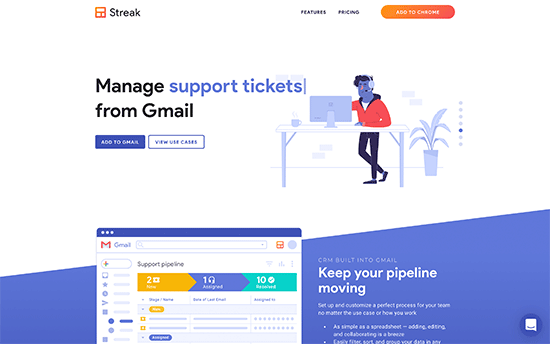
Streak is a CRM software for Gmail and works with both free Gmail accounts as well as Google Workspace. It allows you to track customer emails in Gmail, manage contacts, track leads, and manage sales pipelines.
It automatically captures leads from your contacts, allows you to add tasks and reminders, add tags and notes, create custom pipelines, schedule emails, and so much more.
One thing we like about Streak is it comes with a browser add-on as well as mobile apps for Android and iOS. It supports third-party integrations through Gmail and Zapier, which gives you access to share data across multiple tools and services.
Pricing: Streak’s plans start at $49 per month per user, when billed annually.
Which Is the Best CRM Software for Small Business?
In our expert opinion, we believe that HubSpot, FunnelKit Automations, and Constant Contact are the best CRM software for small businesses.
If you’re looking for a completely sales-focused CRM, then we recommend using either Salesflare or HubSpot because they’re both sales-driven CRMs, and they will help you improve your sales processes.
If you’re an eCommerce brand, and you need a CRM that comes with eCommerce-focused marketing automation, then look no further than FunnelKit Automations. It is extremely powerful and worth every single penny because it’ll definitely help you grow your overall sales.
We hope this article helped you find the best CRM software for your business. You may also want to see our list of the must have WordPress plugins for business websites, best business phone services, and best live chat software for small business.
If you liked this article, then please subscribe to our YouTube Channel for WordPress video tutorials. You can also find us on Twitter and Facebook.





Akash Patel
Great Blog. Thanks for sharing this information. This blog clear all my doubt and queries about the CRM Software
WPBeginner Support
Glad our article was able to help
Admin
Kunle Ajayi
Have been using Hubspot for quite sometimes now. I’ve never been disappointed with their services. Try them out, and if you are using the free plan, try automating some processes using Zappier and or IFTTT.
WPBeginner once wrote some tutorials about IFTTT if I guess right.
WPBeginner Support
While not for CRMs we did write this article about IFTTT: https://www.wpbeginner.com/wp-tutorials/how-to-automate-wordpress-and-social-media-with-ifttt/
Admin